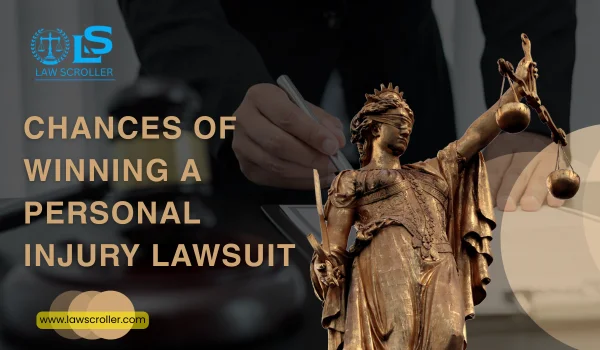Why knowing your chances matters
Personal injuries can happen to anyone—car accidents, slips and falls, workplace injuries, or medical mistakes. If you’ve been hurt due to someone else’s negligence, you might consider filing a personal injury lawsuit. But before jumping in, it’s natural to wonder: Do I actually have a chance of winning? Understanding the odds, what courts look for, and how to strengthen your case can make a huge difference in planning and expectations.
Background: What is a personal injury lawsuit?
A personal injury lawsuit is a legal case filed by someone who has been harmed (physically, emotionally, or financially) because of someone else’s negligence or intentional actions.

- Plaintiff: The injured person filing the lawsuit.
- Defendant: The individual, company, or organization alleged to have caused the injury.
- Common cases: Car accidents, workplace injuries, medical malpractice, defective products, slips and falls, and assault cases.
The goal of a personal injury lawsuit is usually financial compensation for losses such as medical bills, lost wages, pain and suffering, or reduced quality of life. (nolo.com)
Unlike class-action or corporate lawsuits, personal injury cases are often individual disputes. Each case is unique, so the chance of success depends on multiple factors.
Who’s affected — who can file a personal injury claim?
You may be eligible if:
- You were injured because someone else was negligent (e.g., a driver ran a red light, a business failed to clear a wet floor).
- You can prove the injury caused you financial or physical harm.
- The injury occurred recently enough that your claim is within the state’s statute of limitations (the time limit for filing a lawsuit). (findlaw.com)
People not affected:
- Those who cannot show negligence or harm.
- Cases where the statute of limitations has expired.
- Injuries caused solely by the victim’s own actions.
Essentially, anyone who suffered a preventable injury due to another party’s actions can potentially file a claim.
Timeline: Steps in a personal injury case
Here’s a typical timeline for a personal injury lawsuit:
- Day 0: Injury occurs.
- Weeks 1–6: Seek medical attention, document injuries, and notify insurance if applicable.
- Weeks 2–12: Consult a personal injury attorney and evaluate your case.
- Months 1–6: Attorney gathers evidence—medical records, accident reports, witness statements, photographs.
- Months 6–12: File the lawsuit (complaint) with the court.
- Months 12–18: Discovery process—both sides exchange evidence.
- Months 18–24: Negotiation or mediation—many cases settle before trial.
- Months 24+: Trial (if no settlement). Verdict or judgment is issued.
Some cases may settle in a few months, others take years, especially if liability or damages are contested.
What’s at stake
Financial compensation
- Medical expenses: Current and future healthcare costs.
- Lost income: Wages lost due to the injury or inability to work.
- Pain and suffering: Compensation for physical pain, emotional distress, and lifestyle impact.
- Property damage: Repair or replacement costs if property was involved (e.g., a car accident).
Health and quality of life
- Recovering from injuries can involve rehabilitation, therapy, and long-term care.
- A successful lawsuit may provide funds to improve recovery and quality of life.
- In some cases, pursuing a lawsuit also encourages safer practices by the responsible party.
Factors that affect your chances of winning
- Strength of evidence
- Medical records, photos, witness statements, and police reports make your case stronger.
- Clear liability
- The easier it is to prove the other party was at fault, the higher your chance of success.
- Severity of injuries
- Courts weigh serious, verifiable injuries more heavily than minor or subjective ones.
- Comparative negligence
- If you were partially at fault, your recovery may be reduced depending on state law.
- Insurance and defendant resources
- Defendants with strong legal teams or high insurance coverage can affect negotiations and settlements.
- Legal representation
- Experienced personal injury attorneys often improve the likelihood of a favorable settlement or verdict.
What to watch next
- Settlement negotiations: Many cases settle before trial. Your attorney will advise on offers.
- Court dates: If no settlement is reached, your case will be scheduled for trial.
- Deadlines: Statute of limitations, filing deadlines, and response times are critical.
- Medical follow-ups: Documenting ongoing treatment can affect compensation.
- Appeals: Either party may appeal the verdict if the trial outcome is unfavorable.
FAQs: Personal injury lawsuit basics
Am I eligible to file a personal injury lawsuit?
Yes, if you were injured due to someone else’s negligence and the injury caused financial or physical harm. Make sure you file within your state’s statute of limitations.
Do I need a lawyer?
It’s highly recommended. Personal injury law can be complex, and an experienced attorney can help maximize your compensation.
When will the case be decided?
It varies. Many cases settle within months, but trials can take 1–2 years or longer.
How much money can I expect to receive?
It depends on injury severity, medical bills, lost income, liability, and evidence strength. Your attorney can give a more personalized estimate.
Can I settle without going to trial?
Yes. Most personal injury cases are resolved through settlement negotiations or mediation before reaching trial.
What if the other party denies fault?
You’ll need strong evidence to prove negligence. Comparative fault may reduce your award if you share some responsibility.
Understanding your chances helps you make informed decisions, avoid wasted time, and focus on building a strong case. Remember: every personal injury lawsuit is unique, and consulting an experienced attorney is the best way to protect your rights.

 Oliver Johnson is LawScroller’s Senior Legal Correspondent specializing in civil litigation, class actions, and consumer lawsuit coverage. He breaks down complex settlements and court decisions into clear, practical guidance for readers.
Oliver Johnson is LawScroller’s Senior Legal Correspondent specializing in civil litigation, class actions, and consumer lawsuit coverage. He breaks down complex settlements and court decisions into clear, practical guidance for readers.